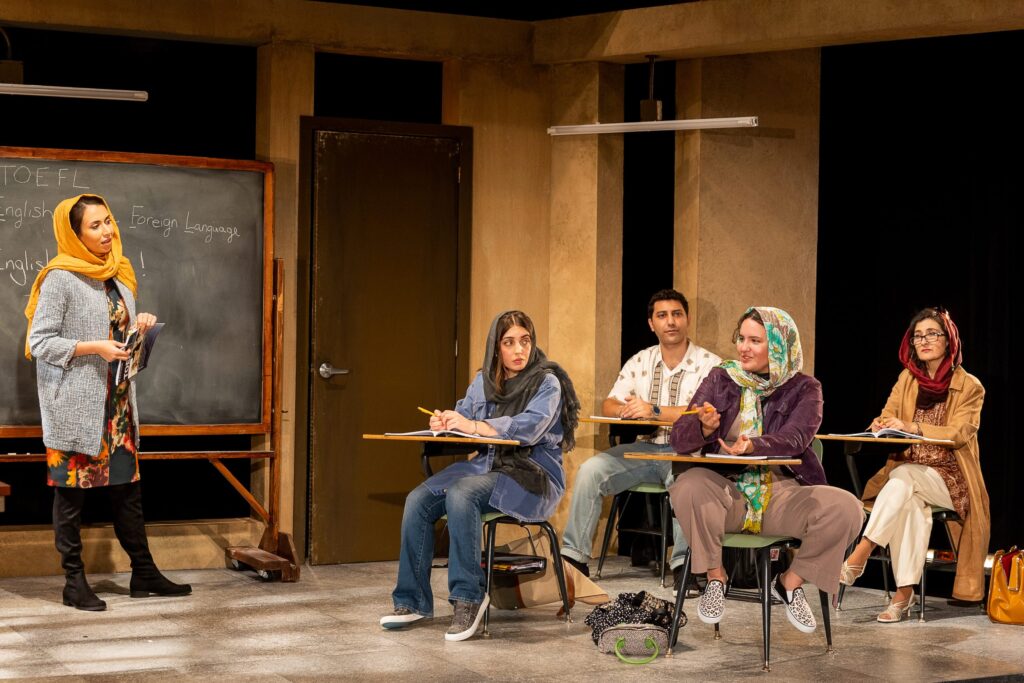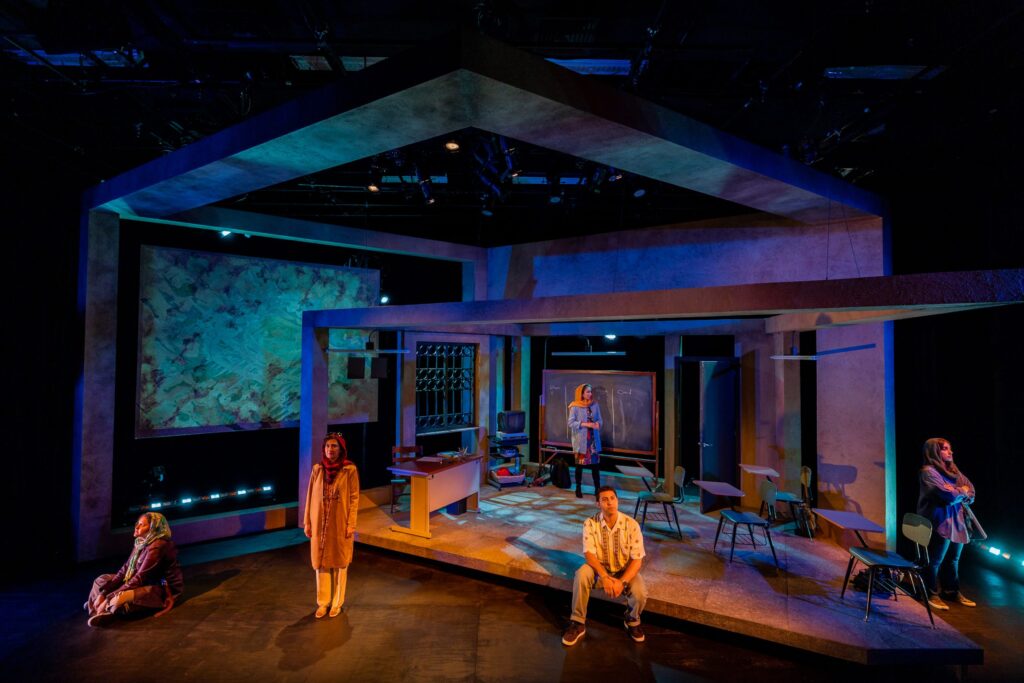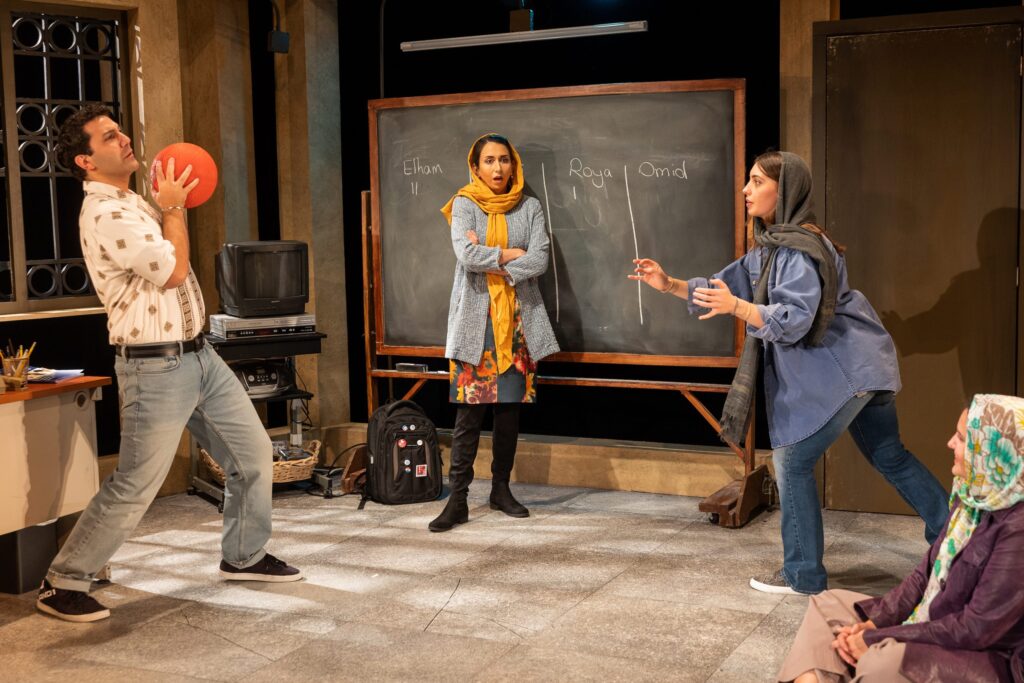
“English” – By Sanaz Toossi. Directed by Melory Mirashrafi. Presented by Speakeasy Stage, Boston Center for the Arts, 527 Tremont Street, Boston, MA through November 19.
by Michele Markarian
“Why do we learn language?” Marjan, a teacher (Deniz Khateri) asks her four Iranian students, who are taking her English class to prepare for the TOEFL exam. The year is 2008, the place is Karaj, Iran. The students are Roya, a grandmother (Leyla Modirzadeh), Elham, a young woman (Josephine Moshiri Elwood), teenager Goli (Lily Gilan James) and Omid (Zaven Ovian).
“To bring the inside to the outside”, responds Omid. This is the struggle with language that all four students share, despite their very different reasons for being in the class. Elham, who has passed the MCAT, has been accepted into medical school in Australia on the condition that she pass the TOEFL exam as well, perhaps even qualifying as a teaching assistant. Roya, whose son Nader lives in Canada with his wife and daughter, has promised him that she’ll learn English before she embarks on her permanent residency in Canada. Goli, a cheerful eighteen-year-old, is in love with the language itself. Omid, the classroom’s only male, claims he has a green card interview in Dubai the following month. Marjan, the instructor, once lived in Manchester England for nine years, something she is still quite wistful about.

Most of the tension in the piece stems from the relationships each character has with the English language; while Goli and Marjan are in love with it, Roya and Elham resent it. Elham’s resistance to English makes her less attractive to Marjan, who frequently loses patience with her. Roya’s phone calls to her son’s home go unanswered, which leaves her frustrated. There’s an attraction between Marjan and Omid based on their ability to converse in English easily with one another, although ultimately Omid is not the Anglophile Marjan takes him for. How much of one’s identity is taken away – or brought into – when moving away from the language of home is terrifying. As Marjan confesses to Omid, after telling him the Farsi is winning over English in her head, “I feel like I’m disappearing”. Yet Elham only feels like a conversation is real if it’s in Farsi. When Marjan apologizes to her in English for letting something confidential slip to the rest of the class, Elham demands – and doesn’t get – an apology in Farsi: “Because I want to hear you tell me.”
As someone who has seen many family members immigrate from the Middle East, the play was interesting in that it deals with the before. Here, on this side, we only see resilience and determination, with only a hint of the heartache and anxiety that accompanies a big shift in culture and language. When the characters speak to one another in Farsi, Toossi cleverly has them speak in quick, intelligent English sentences, to offset the lugubriousness of their otherwise heavily accented and awkward speech. The last page or so of the play, a brief conversation between Elham and Marjan, is spoken in Farsi, and this, to me, was the heart of the piece, as we were truly witnessing a bringing of the inside to the outside.

“English” has some very funny moments, particularly Roya’s numerous voicemails to Nader and some of the English practice dialogues between students. As Elham, Moshiri Elmwood brings a desperate vulnerability beneath a hostile edge; she is terrific at playing more than one emotion in a single moment. Khateri’s Marjan is brittle, kind and sorrowful. Somehow, the character has let life take her in a direction that she seems bewildered by but resolved with. Modirzadeh is funny and willful as Roya. Gilan James is charming as the guileless Goli. Ovian has the hardest role, as Omid’s motives for being in the class weren’t entirely clear to me.
Janie E. Howland’s set, with its old school television, blackboard and folding chairs with arms, projected a perfect sense of time and place. Deftly directed by Mirashrafi, “English” is a lesson in empathy and the courage it takes to move away from what we hold dear. For tickets and information, go to: https://www.speakeasystage.com/

